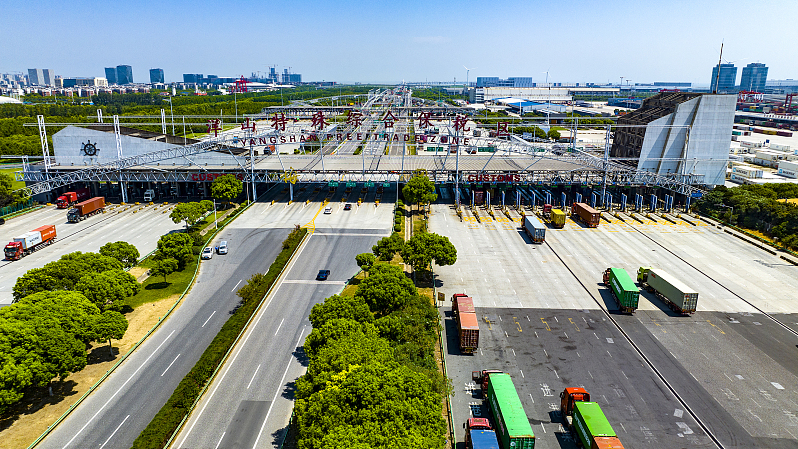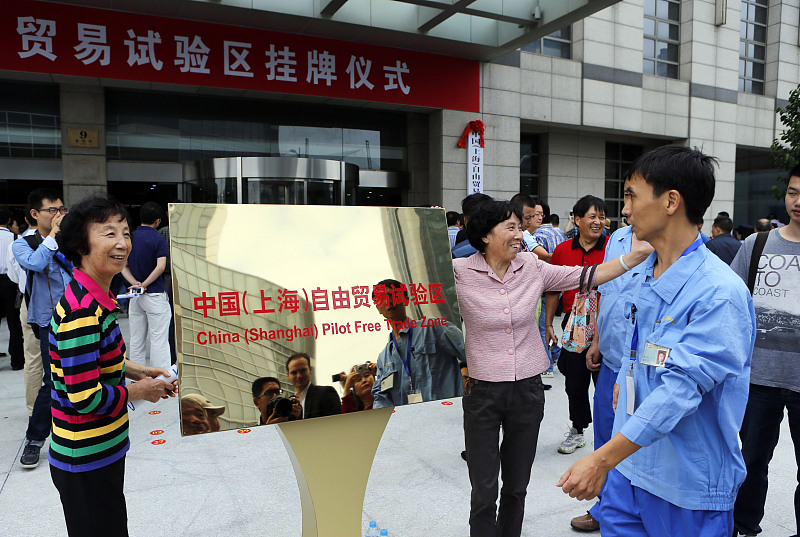
Aerial photo of Yangshan in Shanghai Pilot Free Trade Zone, August 12, 2023. /CFP
Aerial photo of Yangshan in Shanghai Pilot Free Trade Zone, August 12, 2023. /CFP
Editor's note: Liu Chunsheng, a special commentator on current affairs for CGTN, is an associate professor at the Beijing-based Central University of Finance and Economics. The article reflects the author's opinion, and not necessarily the views of CGTN.
The establishment of the Shanghai Free Trade Zone (SFTZ) marks a significant stride for China in the realm of opening up, exerting profound impacts on both the development of the Chinese economy and the global economic landscape. Since its official inception in 2013, the SFTZ has played a pivotal role in advancing economic globalization, enhancing international competitiveness, and fostering innovative development.
This initiative not only represents a new experiment in China's ongoing reform and opening-up efforts but also injects fresh vigor into global economic cooperation. The SFTZ, with its distinctive policy environment and economic framework, provides robust support for China's pursuit of high-quality economic development.
The establishment of the SFTZ provides new opportunities for optimizing and upgrading the economic structure. China's economy is transitioning from traditional labor-intensive and resource-dependent sectors to innovation-driven, high-value-added industries. As a testing ground for reforms, the SFTZ makes full use of market mechanisms and the introduction of external resources to facilitate industrial upgrading. Within the SFTZ, several high-tech and high-value-added industries such as artificial intelligence, biopharmaceuticals, and new energy have seen rapid development, serving as new engines for China's economic growth.
Therefore, the establishment of the SFTZ encourages domestic enterprises to move toward innovative and high-tech sectors, driving industrial upgrading and technological innovation. Within the SFTZ, domestic and foreign companies can engage in more flexible collaborations, introducing international cutting-edge technologies and management experiences to enhance industrial competitiveness and innovation capabilities.
The SFTZ propels trade cooperation between China and countries around the world, facilitating the cross-border flow of goods and services. Through policy innovations within the SFTZ, Chinese enterprises find it easier to import and export goods and services, expanding their international market share, promoting trade balance, and boosting international market competitiveness.
Policy innovations within the SFTZ make it easier for foreign investors to enter the Chinese market, facilitating inflows of foreign capital. Concurrently, the SFTZ provides a more open environment for international talent, attracting high-quality professionals to participate in China's innovation and development. The policy innovations within the SFTZ have expanded the scope for foreign trade and investment development.
The "negative list" system implemented within the SFTZ grants greater flexibility to foreign investors, attracting a significant influx of foreign capital. This system has significantly lowered the threshold for foreign investment, accelerating the expansion and development of foreign trade enterprises. Moreover, by promoting trade facilitation measures, the SFTZ has enhanced the efficiency of imports and exports, further elevating China's position in the global value chain.

The Shanghai Pilot Free Trade Zone was officially inaugurated, September 29, 2013. /CFP
The Shanghai Pilot Free Trade Zone was officially inaugurated, September 29, 2013. /CFP
The SFTZ has undertaken a series of explorations in the financial sector, including interest rate liberalization and capital account convertibility, promoting China's financial system reform and internationalization. Financial innovations within the SFTZ also offer domestic and foreign enterprises more diversified financing channels and financial services.
The SFTZ has carried out a range of institutional innovations and policy optimizations in taxation, legal affairs, administrative approval processes, etc., offering valuable experience for China's comprehensive and deepening reforms. Through the practices in the experimental zone, policies and systems suitable for wider application can be identified, further optimizing China's economic environment.
As the SFTZ looks ahead to the future, it will infuse new vitality into China's pursuit of high-quality economic development. Through measures like promoting economic structural upgrading, fostering foreign trade development, innovating financial support, and enhancing international cooperation, the SFTZ provides a more open and dynamic development environment for China's economy. However, achieving long-term developmental goals will require deeper reforms, policy optimization, and enhanced innovation to ensure that the SFTZ continues to provide a stable impetus for China's high-quality economic development.
The SFTZ's strategic location in Shanghai, a major international trade hub, positions it to play a crucial role in the Belt and Road Initiative (BRI). The SFTZ could serve as a key platform for connecting international trade and investment under the BRI framework. By facilitating cross-border logistics, easing trade procedures, and promoting the development of an international trade service platform, the SFTZ can enhance China's role as a global trade facilitator.
The SFTZ may also drive economic diversification by attracting multinational corporations to establish regional headquarters and research and development centers. By offering favorable policies and a business-friendly environment, the SFTZ can attract foreign investment and encourage these companies to deepen their engagement with the Chinese market. This diversification can contribute to sustainable and inclusive economic growth.
China's commitment to sustainable development is likely to influence the SFTZ's future direction. The SFTZ may implement measures to encourage environmentally friendly practices, such as promoting green technologies, reducing carbon emissions, and integrating sustainable development principles into its policies.
(If you want to contribute and have specific expertise, please contact us at opinions@cgtn.com. Follow @thouse_opinions on Twitter to discover the latest commentaries in the CGTN Opinion Section.)